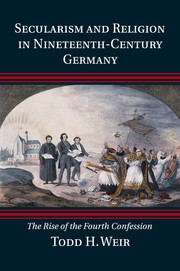Todd Weir awarded prestigious prize by American Philosophical Society

University of Groningen historian of religion Todd Weir has won the 2016 Jacques Barzun Prize for best book of cultural history for his book Secularism and Religion in Nineteenth-Century Germany: The Rise of the Fourth Confession, published by Cambridge University Press. This prestigious prize is awarded annually by the American Philosophical Society, the oldest scholarly society in the United States, founded in 1743 by Benjamin Franklin. Weir will travel to Philadelphia to receive the prize in April 2018.

Todd Weir
Todd H. Weir is Professor of the History of Christianity and Modern Culture at the Faculty of Theology and Religious Studies of the University of Groningen. He is specialized in the cultural and intellectual history of modern Germany and in the transnational history of religion and secularism. Prior to coming to Groningen, he worked at Queen’s University Belfast, the Humboldt University Berlin and the University of Washington. He is the director of the Faculty’s Centre for Religion and Heritage , and coordinates the new Master's programme Religion and Cultural Heritage that has started in September 2017.
He is currently researching how the term ‘worldview’ developed in the clash between secularists and Christians over the past two centuries. In his recent Tedx Talk Whats in a worldview? , Weir challenges us to rethink our assumptions about 'worldview', one of the key concepts in today’s thinking about politics and religion. Weir is co-convening an international conference at the British Academy on 21-22 September 2017 on Religious and Secularist Apologetics in Twentieth Century Politics .
Secularism and Religion in Nineteenth-Century Germany
Weir’s monograph argues for the insertion of secularism into German religious history, not just as a force acting against the existing Christian confessions, but as a confessional force in its own right. The book peels away the layers of German secularism, showing how it developed in the rationalist dissent of Free Religion before taking more atheistic forms in Freethought and Monism. Similar to its religious competitors, it elaborated a clear worldview, sustained social milieus, and was integrated into the political system, making it, in many ways, Germany's fourth confession.
Here is what critics had to say:
'Future scholars will have to contend with Weir's argument that secularism needs to stand alongside Protestantism, Catholicism, and Judaism as a 'fourth confession' in nineteenth-century Germany.' Central European History
'Secularism and Religion in Nineteenth-Century Germany leaves an indelible impression as one of the most original, stimulating, and transformative contributions to a dynamic field that now, thanks to Weir's bold historiographical enlargement, offers the empirical rationale, theoretical flexibility, and explanatory range for clarifying the cultural experience of nearly every German.' The Journal of Modern History
‘Weir's well-argued study is creative and repays careful reading.’ The American Historical Review
American Philosophical Society
The American Philosophical Society, the oldest learned society in the United States, was founded in 1743 by Benjamin Franklin for the purpose of “promoting useful knowledge.” The Society sustains this mission in three principal ways. It honors and engages leading scholars, scientists, and professionals through elected membership and opportunities for interdisciplinary, intellectual fellowship, particularly in semi-annual gatherings in Philadelphia. It supports research and discovery through grants and fellowships, lectures, publications, prizes, exhibitions, and public education. It serves scholars through a research library of manuscripts and other collections internationally recognized for their enduring historic value. The American Philosophical Society’s current activities reflect the founder’s spirit of inquiry, provide a forum for the free exchange of ideas, and convey the conviction of its members that intellectual inquiry and critical thought are inherently in the public interest.
The Jacques Barzun Prize in Cultural History honors Jacques Barzun (November 30, 1907 – October 25, 2012),the distinguished historian who helped establish the modern discipline of cultural history. Jacques Barzun was elected a member of the American Philosophical Society in 1984. The prize was established and funded by Roger Williams, a former student of Professor Barzun. The prize is awarded annually to the author whose book exhibits distinguished work in American or European cultural history.
| Last modified: | 12 June 2023 8.19 p.m. |
More news
-
20 March 2024
Hanneke Muthert appointed professor Psychology of Religion
Hanneke Muthert appointed professor Psychology of Religion
-
05 March 2024
PThU en RUG zetten samenwerking in bachelor Theologie in Groningen voort
De Rijksuniversiteit Groningen (RUG) en Protestantste Theologische Universiteit (PThU) zetten hun samenwerking in de bachelor theologie in Groningen voort, ook na de verhuizing van de PThU naar Utrecht in 2024.
-
06 February 2024
Gaming: only the benefits of religion but not the drawbacks
Lars de Wildt researches the similarities between gaming and religion. In the article, he discusses factors such as music, social community and aesthetics.
